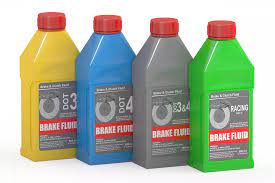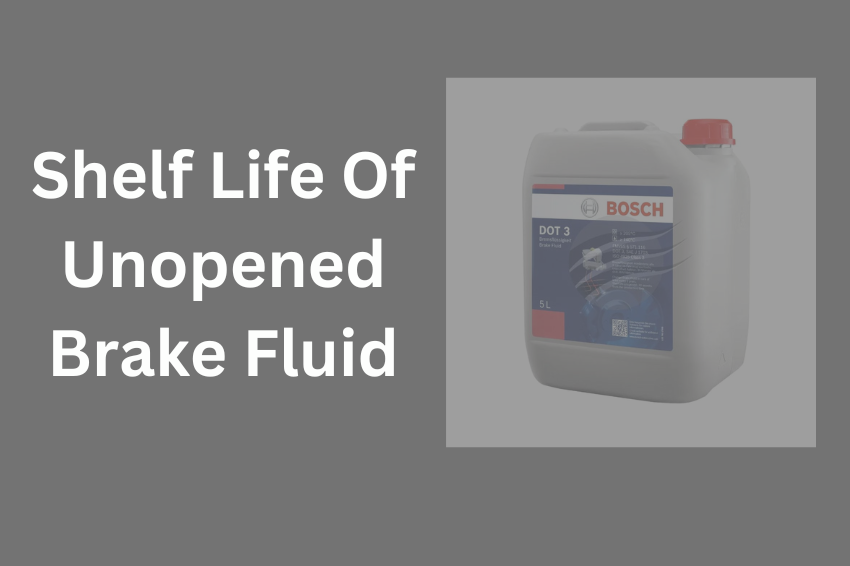Are you concerned about using old brake fluid, even if it’s unopened?
This guide will address the common question of unopened brake fluid shelf life.
Plus, you’ll learn how long it can be stored safely, the potential risks of using old fluid, and best practices for storage.
How Long Can Unopened Brake Fluid Be Stored?
Unopened brake fluid can typically last anywhere from 2 to 5 years on the shelf.
However, this timeframe can vary depending on a few factors, like the type of brake fluid (DOT rating) and storage conditions.
The main reason unopened brake fluid degrades over time is because it can absorb moisture from the air, even through the sealed container.
This absorbed moisture lowers the boiling point of the brake fluid.
The boiling point is important because brakes generate a lot of heat during operation.
If the brake fluid boils, it can create air bubbles in the braking system, leading to a spongy brake pedal and significantly reduced braking performance.

Different DOT ratings (DOT 3, DOT 4, etc.) have varying levels of resistance to moisture absorption.
Generally, higher DOT-rated fluids have a lower initial boiling point but absorb moisture slower, potentially extending their shelf life compared to lower DOT fluids.
Extreme temperatures, both hot and cold, can accelerate the degradation process.
Ideally, store unopened brake fluid in a cool, dry place with a consistent temperature.
Avoid storing it in direct sunlight or areas with high humidity.
Is It Safe To Use Old Unopened Brake Fluid?
It’s generally not recommended.
Even a sealed container can’t completely prevent moisture from entering the brake fluid over time.
Remember, moisture is the enemy of brake fluid because it lowers its boiling point.
A lower boiling point means the fluid can boil under the high heat generated during braking.
This boiling creates air bubbles within the system, leading to a spongy brake pedal and a significant reduction in braking performance.
In critical situations, this can be a major safety hazard, potentially causing increased stopping distances or even complete brake failure.
Unfortunately, there’s no easy way to tell if unopened brake fluid has absorbed moisture and become compromised.
While the shelf life of unopened fluid is generally between 2-5 years, actual usability depends on storage conditions.
Extreme temperatures or high humidity can accelerate degradation.
Since you might not know exactly how long the fluid has been stored or under what conditions, it’s difficult to guarantee its reliability.
Brake fluid is a relatively inexpensive part of your vehicle’s maintenance.
Using fresh fluid ensures optimal performance and safety for your braking system.
Think of it as a small investment compared to the potential risks and consequences of using compromised fluid.
However, If your unopened brake fluid is brand new or only a year or two old, and has been stored properly, it might still be okay to use.
Nevertheless, double-check the manufacturer’s recommendations for your specific fluid type.
If the unopened brake fluid is a few years old (more than 2-3 years), it’s best to err on the side of caution and replace it with fresh fluid.
Difference Between Opened And Unopened Brake Fluid Shelf Life?
The shelf life of brake fluid significantly changes once the container is opened.
Here’s a table summarizing the key differences:
| Shelf Life | Unopened Brake Fluid | Opened Brake Fluid |
| Typical Range | 2-5 years | Up to 1 year (ideally used for the same brake job) |
| Reason for Difference | Sealed container minimizes moisture absorption | Exposure to air allows moisture absorption |
| Impact of Moisture | Slow degradation over time | Faster degradation, lowering the boiling point |
| Safety Risk | Potential decrease in performance over extended storage | Increased risk of compromised braking performance due to boiling |
Think of unopened brake fluid like a sealed bag of chips.
The container acts as a barrier, slowing down moisture absorption.
That’s why unopened fluid can typically last for 2-5 years, depending on factors like DOT rating and storage conditions.
However, once you open the container, even if you reseal it tightly, the air gets in.
Air contains moisture, and brake fluid readily absorbs it because it’s hygroscopic (attracts moisture).
This absorbed moisture lowers the boiling point of the brake fluid.
As I said, brake fluid needs a high boiling point to handle the heat generated during braking.
If the fluid boils, it creates air bubbles in the system, leading to a spongy brake pedal and reduced braking performance
When in doubt, use fresh brake fluid for optimal braking performance and peace of mind.
Best Practices For Storing Unopened Brake Fluid?
Here are some key tips to maximize its shelf life and ensure it performs well when you need it:
- Store In a cool and dry place: Heat and humidity are enemies of unopened brake fluid. Store it in a cool, dry place with a consistent temperature. Ideally, aim for a location around room temperature (around 70°F) and avoid areas with significant temperature fluctuations. A basement or a climate-controlled cabinet are good options.
- Original Container is Best: Unopened brake fluid comes in a sealed container designed to minimize moisture absorption. Don’t transfer it to another container, even if it seems more convenient. Leave it in its original packaging with the seal intact.
- Keep It Out of Direct Sunlight: Sunlight can degrade the quality of brake fluid over time. Store the unopened bottle in a dark place, away from direct sunlight. A shelf inside a closet or cabinet is a perfect spot.
- Mind the Shelf Life: Even with proper storage, unopened brake fluid has a shelf life, typically ranging from 2-5 years depending on the DOT rating. Make a note of the purchase date on the bottle so you can easily track how long you’ve had it. It’s generally recommended to replace very old fluid (beyond 5 years) even if it was unopened and stored well.
While these tips apply to most unopened brake fluid, always refer to the manufacturer’s recommendations for your specific DOT rating.
Some high-performance DOT ratings could have specific storage requirements.
Signs That Unopened Brake Fluid Is Bad?
Unfortunately, there’s no easy way to definitively tell if unopened brake fluid has gone bad.
Unlike food, there aren’t any clear visual signs like discoloration or spoilage to indicate a problem.
However, the main reason behind brake fluid degradation is moisture absorption.
This absorption happens gradually and doesn’t cause any noticeable changes to the appearance of the unopened container.
The most reliable indicators of a potentially compromised fluid are its age and storage conditions.
Following the recommended shelf life (typically 2-5 years) and proper storage practices (cool, dry, and out of direct sunlight) is the best way to ensure your unopened brake fluid remains effective.
Key Takeaway
- Use unopened fluid within its recommended shelf life (ideally 2-5 years).
- Store unopened fluid in a cool, dry place with a consistent temperature.
- Keep the unopened container sealed in its original packaging.
- When in doubt, especially with very old fluid, err on the side of caution and replace it with fresh fluid.
Reference Sources:
